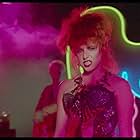"Admirable" and "courageous" are two words that come to mind while watching "Dance Me to My Song." "Frank," "candid" and "uncompromising" can also be used to describe this Australian film about Julia, a woman with a severe form of cerebral palsy that prevents her from doing the most basic things, like getting dressed or going to the bathroom. She's played by Heather Rose, who really is afflicted with cerebral palsy, and who co-wrote the script. (I'll admit feeling acutely uncomfortable at times watching Rose's Julia as she writhes and contorts while making gurgling noises - I'm sure that says a lot more about me than the film or Ms. Rose.)
I saw this movie at the American Film Institute in Washington, D.C. (where it was shown as part of FilmFest DC '99). "Dance Me to My Song" deserves a lot of credit for refusing to blink at Julia's condition. We see her completely undressed; Julia's nakedness conveys her vulnerability without being the least bit prurient or exploitive. Julia is very much at the mercy of Madelaine, her latest assigned caregiver. And it quickly becomes apparent that Madelaine is an extremely selfish person who has no business caring for Julia or anyone else. How she uses - and abuses - Julia is at the core of this drama. Also figuring prominently in the plot is a rather mysterious man named Eddie, whom Julia manages to befriend after comically blocking his path with her motorized wheelchair.
As straightforward and unpretentious as this film is, one thing it's not is... terribly complicated. I'm hard-pressed to think of any scene where it isn't abundantly clear how we're supposed to react; everything is so clear-cut. This scene will make you smile, that one will make you shed a tear, this one will make you laugh, and that one will make you want to shout in anger. The film falls short of true greatness, IMHO, by making Madelaine a near-total witch. There are a few attempts at making Madelaine a more three-dimensional character (including a scene in which she sits by herself and cries), but in the end, it's apparent that we're just supposed to hate her. Further stacking the deck are visits from a woman named Rix, one of Julia's former caregivers who's meant to be every bit as wonderful as Madelaine is horrible. (When Madelaine gets a form of comeuppance from Rix, it's as if the audience is expected to cheer. The AFI audience didn't.) Viewers might rightly wonder: If Madelaine is so awful, why doesn't Julia get rid of her? We get something of an explanation fairly late in the film - it's implied that caregivers are hard to come by, which suggests a lot of borderlines slip through - but it doesn't really explain why Julia tolerates as much ill treatment as she does. (The movie is too preoccupied with making Julia out to be a total victim to consider the possibility of an abuser-enabler relationship.)
Also - and I think this is a legitimate point - for all the time we spend with her, I don't feel as though we get to know Julia all that well (unlike, say, the way I think we become acquainted with Daniel Day-Lewis' Christy Brown in "My Left Foot"). Part of this may have to do with the fact that Julia (and, I assume, Heather Rose) lacks the power of speech (unlike Christy Brown), and must rely on a "voice machine" to synthesize simple spoken sentences. I mourn as a lost opportunity a scene in which Eddie reads a lengthy message that Julia has left on the screen of her personal computer, a message which must have required a Herculean effort on Julia's part to type out. The camera sweeps past the monitor; we can only pick out a few phrases. (The gist of the message is summarized by the film's title.) This was our best chance to experience Julia's inner voice at length, and the movie skips over it.
Still, "Dance Me to My Song" is a strongly acted film, very much worth seeing.










